Mumbai-based automaker Tata Motors wants to sell 50,000 electric vehicles by the end of the fiscal year ending March 31, the company’s chairperson Natarajan Chandrasekaran said during a shareholders’ meeting on Monday.
In the 2023/24 period, Tata — which produces passenger cars, trucks, vans, coaches, buses, luxury cars and construction equipment — aims to hit 100,000 EV sales, according to Chandrasekaran, as reported by Reuters.
The push toward EVs follows a national plan to ensure that up to 30% of total passenger car sales in India are electric by 2030, up from about 1% today. E-scooters and e-bikes will account for 80% of two-wheeler sales, up from 2% today. Given the Indian government’s high import duties on EVs, getting citizens to make the switch to electric will largely depend on the success of local production.
After attempting to bring its EVs to the Indian market, Tesla appears to have abandoned efforts to set up a factory in the country. Tesla usually has a “try before buy” approach to moving into new markets — it imports vehicles to see how sales go before investing the time and money in building a regional factory. Transport minister Nitin Gadkari said Tesla was welcome to build a factory in the country, but that it won’t allow the automaker to bring in vehicles from China to sell and service, so Tesla hasn’t moved forward with those plans.
Tata currently sells three EV models, including Nexon EV, Tigor EV and the newest Nexon EV Max. Unlike the path many U.S. automakers have followed of building new EV production lines from the ground up, Tata says it’s able to keep costs down for the Indian consumer by repurposing a successful internal combustion engine model, the Nexon, and outfitting it with a battery pack. The Nexon starts at around $19,000, which isn’t exactly cheap for the average Indian driver, but is certainly within the range of the country’s upper-middle class.
Tata commands 90% of India’s electric car sales, and appears to be on track to reach its goal of selling 50,000 EVs by March 2022. The automaker’s June sales results show 45,197 total units sold, out of which 3,507 were electric — the most Tata has ever sold, and up 433% from 658 last year.
Chandrasekaran was optimistic about the trajectory of Tata’s performance this fiscal year with the overall supply situation, including that of semiconductors, improving and stabilizing.
